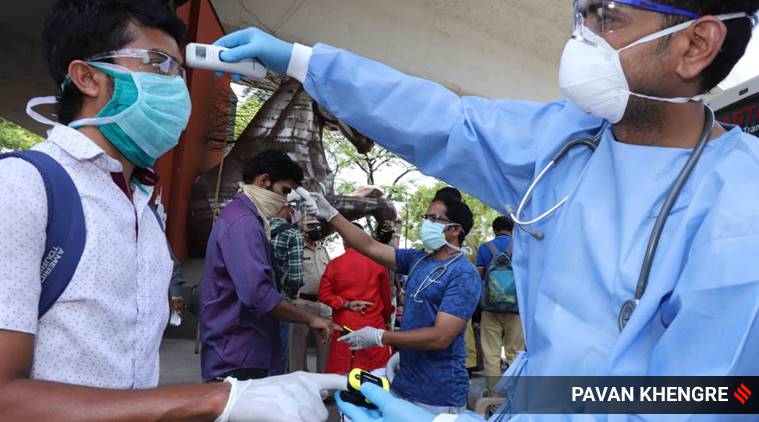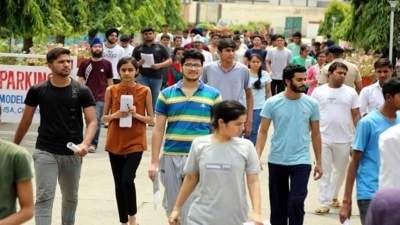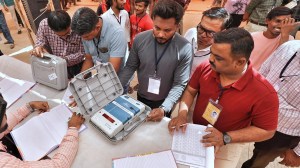- India
- International
Covid 19: Pooled testing for zero-case districts as norms are eased for home isolation
The ministry has also revised home isolation guidelines, specifying that “there is no need for testing after the home isolation period is over”.
 According to the Health Ministry’s data, 216 districts had not reported any case till last week. (Representational)
According to the Health Ministry’s data, 216 districts had not reported any case till last week. (Representational)
WHILE THE number of fresh novel coronavirus (Covid-19) cases in the last 24 hours touched a new high at 4,213 on Monday, including 97 deaths, the Ministry of Health and Family Welfare has decided to carry out pooled testing in all districts – including those which have not reported any case so far – as part of its nationwide surveillance plan.
The ministry has also revised home isolation guidelines, specifying that “there is no need for testing after the home isolation period is over”. It has said that the “patient under home isolation will end home isolation after 17 days of onset of symptoms (or date of sampling, for pre-symptomatic cases) and no fever for 10 days.”
The earlier guidelines stated that such patients will end home isolation if symptoms are clinically resolved and the surveillance medical officer certifies him/ her to be free of infection after laboratory testing.
With the total case count touching 67,152 (2,206 died, 20,916 recovered), it has already crossed the government’s projection of 65,000 cases by May 15, as shared with the states earlier.
Read| Explained: What is pooled testing, recommended by the ICMR?
According to the Health Ministry’s data, 216 districts had not reported any case till last week. The ministry plans to include such districts in its countrywide surveillance, which will be carried out in 10 health facilities (6 public, 4 private) in each district.

Both high-risk (healthcare workers) and low-risk (non-ILI Out Patient Department patients and pregnant women) groups will be selected.
“There is a need to establish systematic surveillance for SARS-CoV-2 infection in all districts of the country. This surveillance will be in addition to the routine testing as per current testing guidelines. Besides the facility-based surveillance, ICMR (Indian Council of Medical Research)/ NCDC (National Centre for Disease Control) in collaboration with key stakeholders and state health departments is initiating a population based sero-survey in selected districts representing the case detection across the country,” says a document on district-level facility-based surveillance for Covid-19 issued by the Health Ministry.
Read| Covid 19: Pooled testing for zero-case districts as norms are eased for home isolation
According to the plan, 100 samples will be collected from high-risk groups and 50 each from the two groups of low-risk population each week.
“Throat/ nasal swabs to be collected for RT-PCR tests. Samples should be tested in a one-time pool of 25. Results of this sample pooling is only for surveillance purposes. It should not be used for diagnosis of individual patients. In addition to throat/ nasal swabs, blood samples should be collected for detecting IgG antibodies for ELISA testing. In subsequent rounds, IgG ELISA based testing of serum samples will replace RT-PCR based testing for surveillance purpose,” says the document.
The surveillance will be carried out in partnership with district and state health administration, IDSP (Integrated Disease Surveillance Programme), NCDC, ICMR institutes, community medicine departments of medical colleges and public health institutes.
Meanwhile, at the daily briefing, Health Ministry Joint Secretary Lav Agarwal reiterated that India had not reached the stage of community transmission.
Read| Explained: New reasons why masks help
“Our policy has been to implement containment strategies with extra stringency wherever more cases are detected. Some clusters have been found, and in some cases, in some particular locations, relatively large outbreaks have also been noticed. The AIIMS Director had said that if we do not do containment properly, transmission rates will go up. It is important to continue the containment strategy with rigour to prevent the country from going into community transmission,” he said.
While 3,277 new cases and 128 deaths were reported on Sunday, the daily count was 3,320 new cases and 95 deaths on Saturday.
Agarwal also sought to allay concerns on the possibility of infection spreading in AC trains, which are set to resume from Tuesday. “Centralised AC can be used, but there is a need to monitor flow of air. if there is any aerosol-induced spread risk, we can travel without AC too,” Agarwal said.
He denied that there was any effort to map Covid risks by community. “Please spread the right information, we will get the disease if we violate guidelines. Covid does not see religion,” he said.
Apr 18: Latest News
- 01
- 02
- 03
- 04
- 05






































